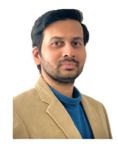Keynote Speaker – Tahir Mohammad, PhD, MSc, B.Tech
Tahir Mohammad, PhD, MSc, B.Tech – University of Turku, Finland

Tahir Mohammad received PhD in Engineering in 2016 from the International Islamic University Malaysia where his research focused on game-theoretic modelling for improving spectrum sensing and network throughput in cognitive radio networks. He completed his Master’s degree in Communication Engineering from International Islamic University Malaysia in 2011 working on the physical layer security for wireless networks. Before joining the University of Turku, Tahir Mohammad worked as a Senior Lecturer and Program Leader at Sunway University Malaysia where he managed the dual degree program of BSc in Computer Networking and Security offered in partnership with Lancaster University UK, and successfully led several funded research projects.
Prior to joining academia, Tahir Mohammad worked for government-funded R&D companies in Malaysia (MIMOS, TM R&D). His work included designing and implementing proof-of-concept using software-defined radios for efficient spectrum utilization and architecting and implementing IoT based vertical solutions. While he was in the industry, he co-authored two patents on wireless communication and two on IoT. He has also worked in start-ups implementing IoT middleware and smart tracking solutions. He has good experience in providing consultancy services, developing educational materials, and delivering industrial training on IoT. His research interests include 5G/6G networks, the Internet of Things, cybersecurity, game theory and applied machine learning for wireless networks and the application of blockchain for IoT and wireless networks.
His research spans the physical, MAC, and network layers of the OSI model focusing on designing and developing smart, secure, and self-organizing systems that apply to wireless networks and IoT. Smart cities, for example, need to integrate cyber-physical critical infrastructure (e.g. smart grids, water networks) and wireless systems. Developing resilient and secure processes for managing various smart city components requires multiple components to adaptively and optimally manage resources (power, spectrum, QoS etc.) to operate efficiently and recover quickly in case of failure. He is exploring various techniques, such as machine learning, optimization techniques, Blockchain and game theory to develop appropriate solutions.

